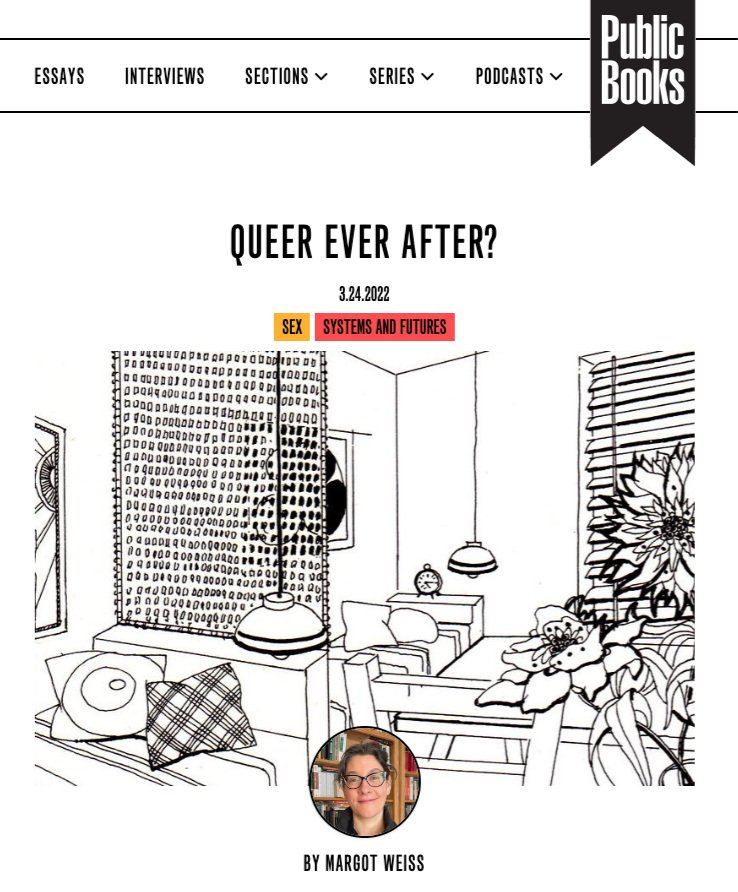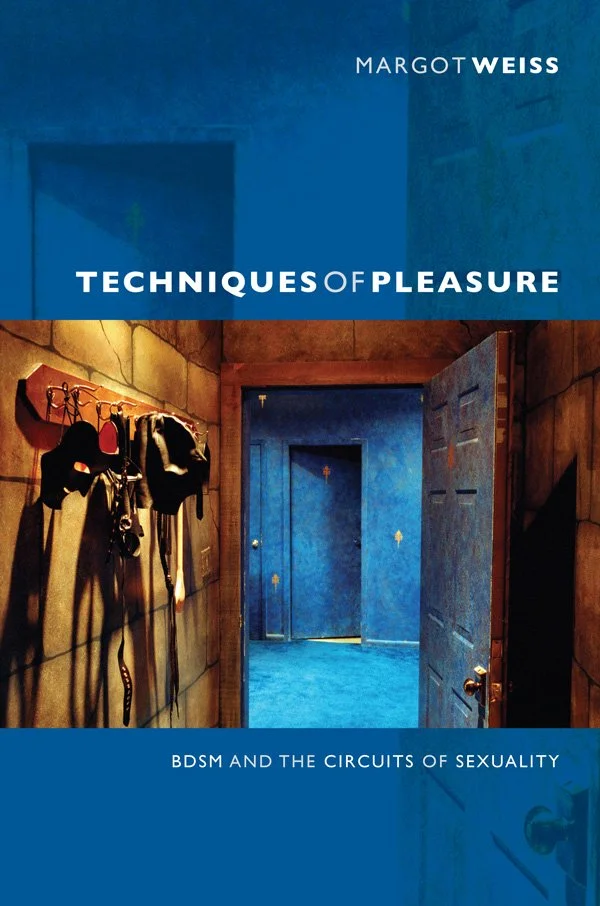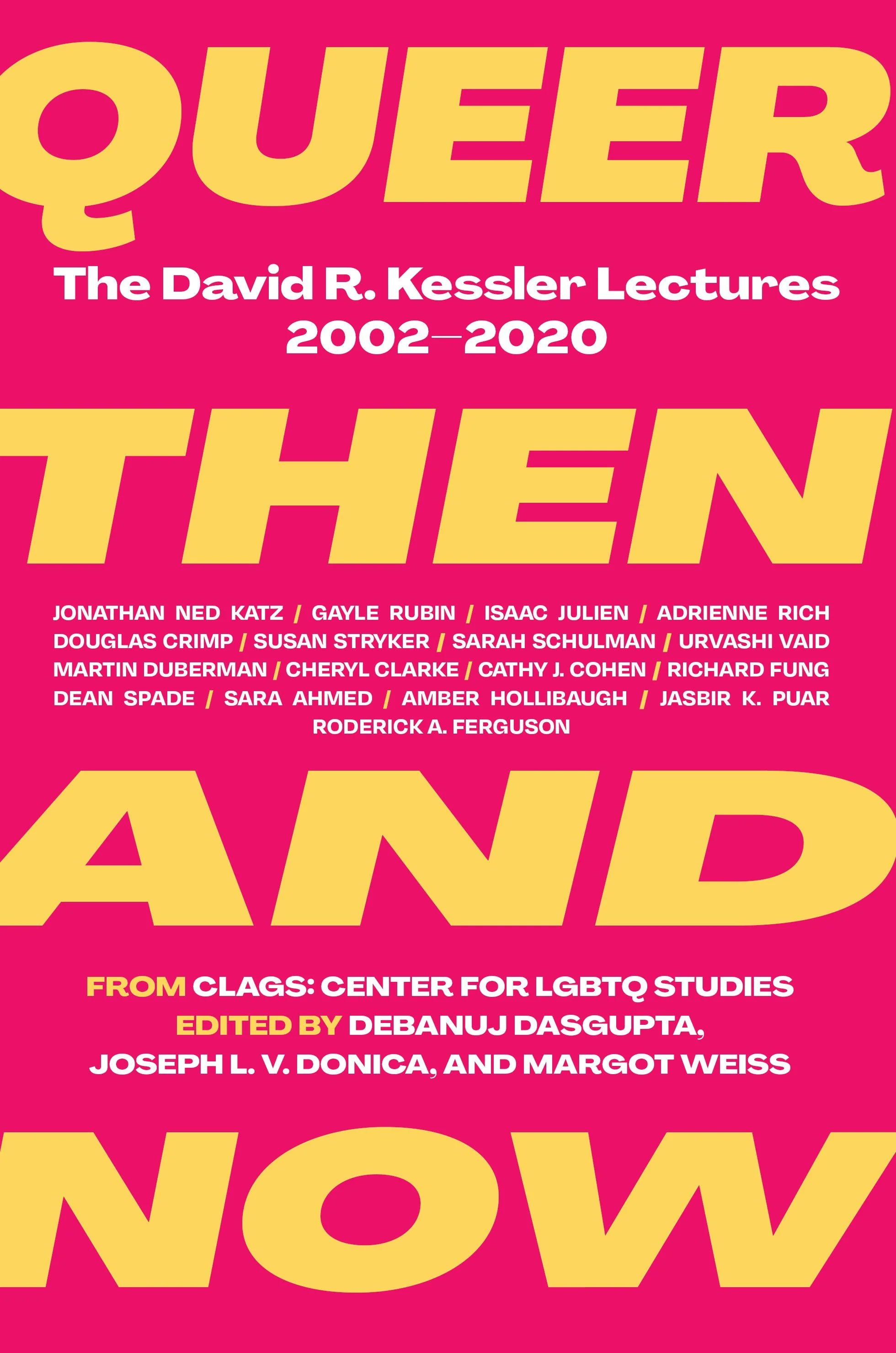Anthropology | Queer Studies | BDSM | Academia + Activism
Margot Weiss is a cultural anthropologist who draws on queer theory, left cultural critique, and ethnographic analysis to understand the contradictory relationships between queer sexual cultures/politics and contemporary US capitalism. Her books include Techniques of Pleasure: BDSM and the Circuits of Sexuality (Duke University Press, 2011), which won the Ruth Benedict Book Prize and was a finalist for the Lambda Literary Award in LGBT Studies; Queer Then and Now: The David R. Kessler Lectures, 2002-2020 (The Feminist Press, 2023); and Unsettling Queer Anthropology: Foundations, Reorientations, and Departures (Duke University Press, 2024). She has published over 20 articles and essays in a range of anthropology, queer studies, and American studies journals, including GLQ, American Quarterly, Cultural Anthropology, New Labor Forum, Sexualities, American Anthropologist, and Feminist Anthropology. Currently, she is writing a book about the politics of institutional knowledge production and the place of desire in queer/left activism.
Books
Selected Essays
-
link: American Anthropologist 123(4)
In this reflexive commentary, I consider the forms of writing that we use to differentiate expert knowledge or theory from "data". I link the politics of (interlocutor) acknowledgment to the politics of citation, to refuse to reproduce extractive disciplinary models of knowledge production.
-
link: Unsetting Queer Anthropology
Does Queer Theory + Ethnography = Queer Anthropology? This chapter reframes the canonical origin story of queer anthropology by disrupting the hierarchical binary of queer theory (from the humanities, and purportedly universal, unsituated, portable) and ethnographic data (from the social sciences, and particular, emplaced, a-theoretical) to show not only that queer theory depends on prior queer anthropology, but also that queer theory’s disavowal of empiricism has effaced both its own historical situatedness and its accountability to its subjects and sources. Aiming to dislodge the universalist aspirations that produce queer theory’s canonical white-and American-ness, I read a genealogy of situated, queerly empirical theory back in to queer theory.
-
link: Feminist Anthropology 3(2)
What is "queer" in contemporary transnational queer studies? In this conceptual review, I explore queer as a political-intellectual orientation and aspirational field animated by its constitutive polarity: between a more constrained queer focused on sex, sexuality, and gender and a more expansive queer that bears an oblique relationship to these more proper objects. Throughout, I reflect on anthropology's place in a larger project of a queer theory from (and seeking) an elsewhere.
-
link: Anthropological Quarterly 93(1)
This article explores ethnographic intimacy beyond an identitarian focus on sex, sexual identity, and sex-desire by reflecting on three of my own fieldwork projects in queer anthropology. Bringing queer, decolonizing, postcolonial, and critical race theory into conversation with reflexive work on sex in/and ethnographic fieldwork, I argue that broadening our conceptions of intimacy enables us to think less about sex in the field and more about sex as a field—a field of encounters, relationalities, and entanglements that connects us queerly to others. I suggest that such approaches to ethnographic knowledge might disrupt anthropology's colonial object relations by embracing a critical intimacy of interrelationality—staying with, rather than foreclosing, reifying, or trying to master, the overwhelming aspects of both sex and ethnography.
-
link: Sexualities 24(5-6)
A personal reflection on the histories of cultural analysis of BDSM and BDSM theory
-
link: Cultural Anthropology 31(4)
Queer, from its start, was meant to point beyond or beside identity—specifically gay and lesbian—and instead signify anti-normativity, especially but not exclusively heteronormativity. But queer has never quite moved beyond identity. In this essay, I explore queer’s relation first to identity, then antinormativity, and finally to the future-facing possibility I call desire that marks much recent work. Rather than offer a linear history, I argue that these three concepts—identity, normativity, and desire—are constitutive tensions in the past, present, and future of queer anthropology. I suggest that it is the frustration of the desires we invest in our objects that makes for a queer anthropology—and that makes anthropology queer.
-
link: Routledge History of Queer America, Don Romesburg (ed.)
Neoliberalism has had a profound effect on post-1970s LGBT/queer cultures and politics. This essay reviews how, by privatizing social services, fostering consumer citizenship, and promoting corporate welfare and urban redevelopment, neoliberal policies have pit “deserving” gays and lesbians against “undeserving” others: the same-sex married couple vs. the “welfare queen,” the gay/lesbian consumer-citizen vs. the poor queer, and the gay gentrifier vs. the “dangerous” other. Historicizing these oppositions reveals the intersections of sexuality, class, gender, race, and social policy that remain central to queer politics today.
-
link: New Labor Forum 24(3)
Contrary to the myth of gay affluence, research shows that queer and gender non-conforming people are more vulnerable to poverty than their straight and cisgendered counterparts. Yet this myth is sustained by the mainstream LGBT movement and too often shared by the progressive and activist labor movement. It is a particularly destructive myth for labor organizers because LGBT/Q people make up a disproportionately high number of the people in low-wage service sectors. The concept of queer precarity centers LGBT/Q lives, as genders, sexualities, and orientations intersect with the lived realities of class and race. This essay seeks to develop a new political vision that centers sexuality, gender and desire in our movements for social and economic justice.
click here to access my full publications.
Selected Media + Collections

AnthroBites podcast: What is Queer Anthropology? In this episode, Margot Weiss speaks to contributing editor Jara Carrington about queer anthropology.

Edited collection on anthropology and the politics of collaboration for Cultural Anthropology, with Dana-Aín Davis, Michal Osterweil, Elizabeth Chin, and Savannah Shange. What are the political desires that incite and sustain collaboration? How does collaboration challenge and also reproduce hierarchical ethnographic knowledge practices? What are collaboration’s contradictions? (2016)

Critical Lede Interview with Margot Weiss. In this episode, we talk with Margot Weiss about BDSM, pleasure and neoliberalism in her new book Techniques of Pleasure: BDSM and the Circuits of Sexuality.

“Only the Truth Is Revolutionary” : Porno Dialectics, Ethnography, and Anti-Capitalist Critique. Margot Weiss on Heather Berg's Porn Work for the Syndicate.

Read "Queer Ever After?," a short review essay on the contradictions of queer critique in increasingly straight times, on Public Books.

Edited forum on left intellectuals and the neoliberal university for American Quarterly (with Naomi Greyser), with Mattilda Bernstein Sycamore, Purnima Bose, Aimee Carrillo Rowe, Matthew Garrett, Janet R. Jakobsen, Mara Kaufman, Jeff Maskovsky, Scott Lauria Morgensen, Jasbir Puar, Dylan Rodríguez, Feministing.com, and Against Equality (2012).

(video) Margot Weiss, lecture at the Center for the Humanities: “Desiring Otherwise: Queer Horizons of Activist and Academic Knowledge.” image: Jay Toole’s NYC “Walking Tour of the Queer Village in the 60s” thanks to Katie Brewer Ball.

(video) Book Launch at Bureau of General Services—Queer Division: Unsettling Queer Anthropology, Margot Weiss with Martin Manalansan and Shaka McGlotten

(podcast) Margot Weiss, Unsettling Queer Anthropology, interviewed on New Books in LGBTQ+ Studies

(video) CLAGS roundtable with Brian Horton, Scott Morgensen, Anne Spice and Margot Weiss about new directions in queer of color and decolonizing queer anthropology


